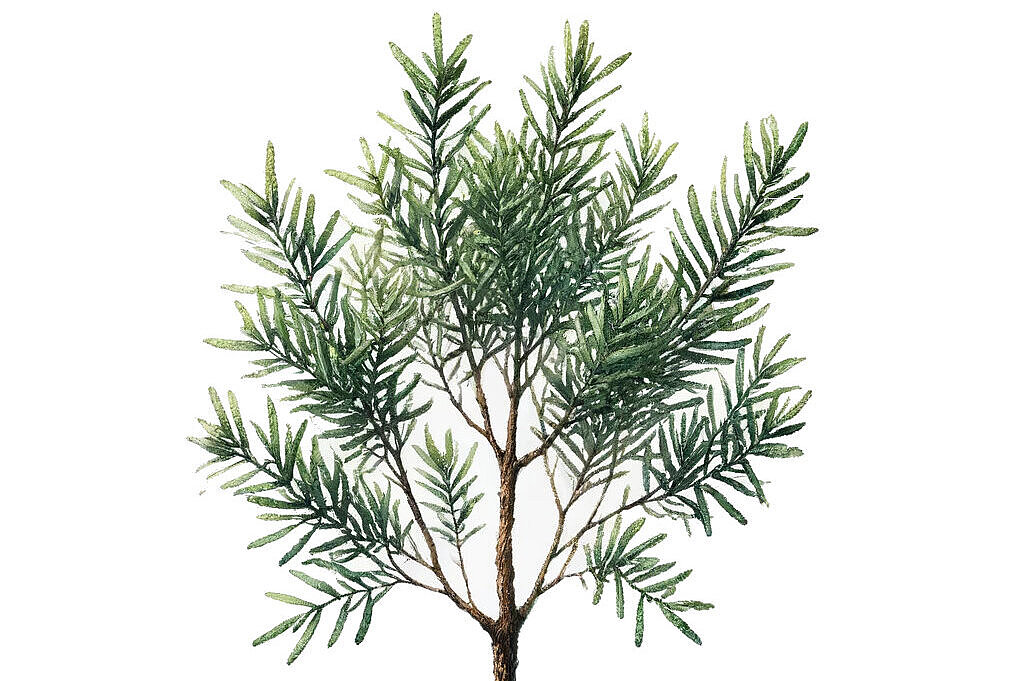Eucalyptus tree

The eucalyptus tree: a profile
Chemical composition
Eucalyptus leaves contain a variety of chemical compounds, among which eucalyptol (also known as 1,8-cineole) is the best known. This substance is responsible for the characteristic scent of eucalyptus and plays a central role in its therapeutic properties.
Essential oils: a fragrant danger?
Eucalyptus essential oil is highly concentrated and is extracted from the leaves of the tree. While it is valued in human medicine for its antibacterial, anti-inflammatory and expectorant properties, its use in dogs must be viewed with great caution.
Eucalyptus and dogs: a toxic relationship?
Toxicity of eucalyptus
Eucalyptus is toxic to dogs. Ingestion of plant parts can lead to a variety of symptoms, ranging from mild to severe. The essential oil, in particular, is highly toxic to dogs and can cause serious health problems even in small amounts.
Symptoms of poisoning
Symptoms of eucalyptus poisoning in dogs include:
- Salivation
- vomiting
- diarrhea
- weakness
- Difficulty breathing
- lethargy
- Muscle tremors
Immediate veterinary care is required if eucalyptus poisoning is suspected.
Safe handling of eucalyptus in a household with dogs
Preventive measures
- Ensure that eucalyptus plants and products are kept out of your dog's reach.
- Do not use eucalyptus essential oil around your dog, especially in the form of diffusers or sprays.
Alternatives for your dog's health
There are numerous alternative plants and oils that are safe for dogs and can provide similar therapeutic benefits. These include chamomile and lavender, which are known for their calming properties.
Bottom line:
Eucalyptus - A beautiful tree to be enjoyed with caution
Eucalyptus, a tree highly prized in human medicine and wellness, poses a potential risk to our dogs. The toxicity of its components, especially the essential oil, requires conscious and careful management in any household where dogs live. It is crucial to protect our faithful companions from exposure to this plant and to seek veterinary help immediately if we suspect any risk. By educating ourselves about the risks and taking preventative measures, we can ensure that our dogs stay healthy and happy by our side.
If you notice any signs of hypersensitivity or poisoning in your dog, you should see your vet immediately. We are not a substitute for a vet, but we try to be as accurate as possible. Every dog reacts differently and we recommend you get a second opinion or consult your vet if in doubt.
Stay healthy and take good care of your four-legged friend!😊
Similar to Eucalyptus tree
The acacia tree is characterized by its unique composition. It contains: Phytochemicals: naturally occurring chemicals found in the leaves, bark and seeds of the tree. Some of these compounds can...
The Australian tea tree has been known for centuries for its antibacterial, antiviral and antifungal properties, making it a popular ingredient in the manufacture of skin care products and...
Eucalyptus piperita, a hybrid of eucalyptus and peppermint, does not exist in nature. For the context of this article, we take a hypothetical perspective based on similar plants such as eucalyptus...
Lemon eucalyptus (Eucalyptus citriodora or Corymbia citriodora) is a tree from the myrtle family that is known for its strong lemon aroma. This aroma comes from citronellal, a major component of the...



